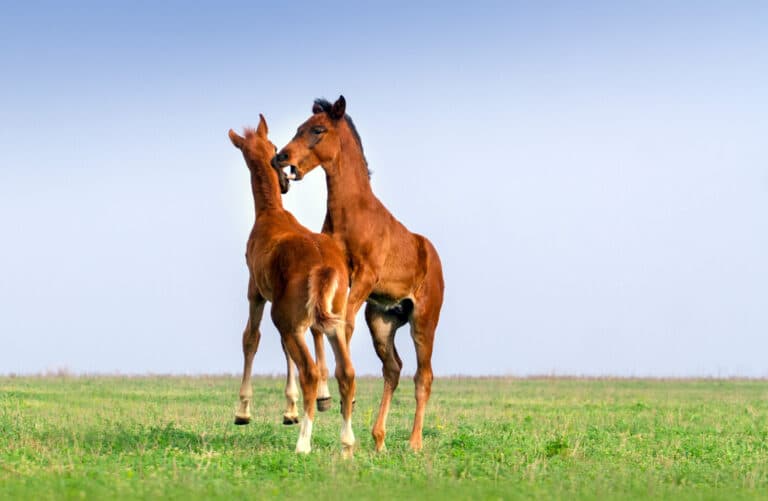Habits, stress and learning: an intriguing combination that has kept horse trainer and PhD candidate CATH HENSHALL very busy.
Like many people, as a youngster Cath Henshall grew up with horses before putting them on pause awhile when she moved away from home. But, unlike many people, when she revisited horses it was as an academic student who was studying animal behavioural science and equitation science, and who was also a hands-on horse trainer.
Cath is currently nearing the completion of her four year-long PhD investigating the effects of stress and exercise on how horses learn, using an applied neuroscience lens to interpret their behaviour and physiology.
Cool vs correct
There was a pivotal moment in Cath’s journey when she honed in on the specific horse training issue of stress and the impact it had on learning. It was while she was watching someone teaching students how to handle weanlings that the question came up for her.
The young horses had experienced a very abrupt weaning and had been brought in from being out on pasture to being stabled on their own, so multiple environmental factors were contributing to their stress. They were learning to lead and to have their feet handled, and some were responding adversely by rearing and biting, which, as Cath points out, is how they naturally solve their problems in the paddock: “They bite, they kick, they play,” she explains. “Obviously for humans, this is not acceptable. But, while I was trying to teach the students to use positive reinforcement and equitation science principles to best train the weanlings, the other teacher was basically smacking them in the face with a pool noodle to stop them biting.”
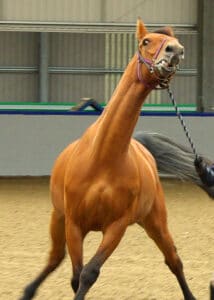
Yanking on the lead rope of a young horse only adds to their stress.
Not surprisingly, these horses responded by rearing, which was ‘remedied’ by yanking on their head collars. The whole procedure was far from ideal, which got Cath thinking. “I needed to do this PhD not because of the horses, but because the students thought that what the other trainer was doing was really cool and appropriate, while what I was doing was boring. All those little repetitions, accepting small tries and keeping it low arousal? The students weren’t into that, they wanted the ‘cool’ stuff.”
It made Cath realise some players in the horse industry really do normalise these big stress responses. She already knew from her Masters studies that stress can interfere negatively with learning. In the case of the weanlings, that was the first time they’d been exposed to learning what should have been really important lessons to make them safe and calm to handle for the rest of their lives. “While it might look pretty spectacular when you know you can control a rearing horse on the end of the lead, is that actually helping the horse to learn? Is it helping you? Is it safe for you? Does it mean that the horse is then set up for learning what we need them to learn?” questions Cath.
How stress affects learning
But through her research, Cath discovered not all stress in horse training is undesirable. She designed an experiment testing how easily horses exposed to various levels of stress learned a new task, and found that moderate stress resulting from exercise was beneficial.
The test involved three groups of horses over a period of twenty-two minutes. The control group did nothing; the second group was exposed to stress; and the third group were ridden in an easy, relaxed warm-up. All three groups were then taught a new task: they were asked to move away from whip taps on their rump. “What we measured was how long it took for them to learn the task. We found that the exercised horses learned more quickly than either the stressed or control group horses,” Cath explains.
The exercised horses mastered the new task much faster, learning to move away in an average of twenty-two repetitions. The stressed horses took on average thirty-six repetitions, and the control group averaged forty-six repetitions.
The takeaway here for any rider or horse handler is that exercise is beneficial for helping horses to learn more quickly. “I had an idea that that would be the result because when I was training, if my horses were a bit sluggish I’d just take them on a loose rein around the arena for five minutes at a canter. I’d always find that, provided they weren’t too stressed to begin with, it would improve their learning,” says Cath, explaining that energetic exercise generates increases in noradrenaline, cortisol and other elements that are particularly good for helping form connections in the brain, thus helping the brain to learn and remember things.
It’s important to note that the exercise component in that study was not stressful in itself. While the stress group were chased around to increase their anxiety, the ridden group were exercised on a loose rein. “It was big figures of eight, not worrying about where their head was, nothing like that. It was just walk, trot, canter around the arena and then we did the test. That type of exercise was beneficial,” Cath says, adding that twenty-two minutes of this pre-tutelage warm up was just the right amount of time to get the horse’s neurotransmitters up to optimum learning level.
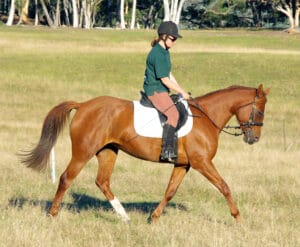
Cath found that moderate stress resulting from exercise was beneficial.
Default mode
Often when a horse is sent to a trainer for retraining, when it first arrives home the problem behaviour is resolved. But within a few weeks, the horse reverts to its previous behaviour. For Cath, the question was why, what’s going on in the horse’s brain? To find answers, she undertook a second experiment examining cognitive flexibility, and exploring stress from the perspective of how well horses were able to acquire new learning.
To do this, the horses were first taught a particular habit. Half the group was then subjected to stress before being taught, in a scenario similar to retraining, the exact opposite of the first learning they’d been given. Finally, in another test they were given the choice of either doing the new behiour, or reverting to the old behaviour. Based on which behaviour they’d chosen, the results were examined statistically to see whether the stress treatment they’d been given in between learning the old behaviour and the new behaviour had had an effect.
Surprisingly, the results were contradictory to expectations. “The stress didn’t actually affect how well the horses initially learned the new behaviour,” Cath says, “but what we did find was horses that have had to learn a difficult task – which in this case was moving towards the tapping of a whip rather than away from it – were more likely to revert back to the old behaviour, compared to horses which either weren’t stressed or had initially learned an easy task. We’re still theorising, but we think that the cumulative effect of the stress of learning a hard task and the stress itself, made them more likely to go back to the old behaviour.”
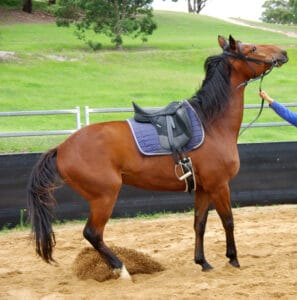
A stressed horse in hand in the round yard.
So here’s an example of how this plays out in a real-world scenario: You want your horse to stop pulling on the reins, and the trainer re-trains it. At home, when they’re not stressed, the horse no longer pulls on the reins. But you take them out to an event and suddenly that old behaviour starts coming back. “It’s easy to think the horse is being disobedient or it’s just a dumb horse, that it can’t remember, or it’s arrogant or not listening to you,” Cath says, “but it’s quite likely that what’s happening is the brain is being hijacked by old processes, so that it just goes back to that previous habit.”
For humans and horses, because of the way habits are remembered and processed in the brain, we’re set up to default back to old habits because it’s cognitively efficient to do so and uses fewer resources in the brain. “That’s why habits are good when they’re good; when they’re habits that we want in our horse, habits are great. In effect, the horse doesn’t have to think about them, it just does them,” says Cath.
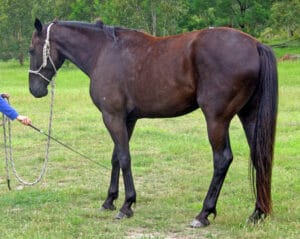
Exercised horses mastered new tasks much faster than those that were stressed or who had done nothing.
However, until the neural pathways of a new habit have had enough repetitions to override the original habit, a horse is more likely to revert back to an old, deep-seated habit over a newly trained one when they’re stressed.
The solution? Keep the repetition of the new training up! If the rider doesn’t change the way they ride to match and continue to reinforce any new training, new lessons won’t stick. A great idea is to get lessons with your trainer before you take your horse home to ensure the best chance of long-term retraining success.
Over in the Equestrian Hub VIP area we have more on Cath’s work, including the controversial experiment in which she busts the ‘magic’ myth of join up with a remote control car.
Feature Image: Biting, kicking and playing is how young horses naturally solve their problems in the paddock. All images courtesy of HorseLogic

